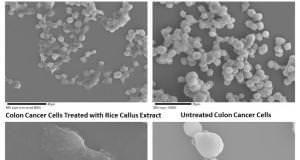Why Good Hair Matters: Mutation for Thick Hair Does Much More
The first animal model of recent human evolution reveals that a single mutation produced several traits common in East Asian peoples, from thicker hair to denser sweat glands, an international team of researchers reports.
Cellular Automaton Model Predicts How Hair Follicle Stem Cells Regenerate
Your hair -- or lack of hair -- is the result of a lifelong tug-of-war between activators that wake up, and inhibitors that calm, stem cells in every hair follicle on your body, according to Cheng-Ming Chuong, M.D., Ph.D., of the University of Southern California (USC).
Ancient Teeth Bacteria Record Disease Evolution
DNA preserved in calcified bacteria on the teeth of ancient human skeletons has shed light on the health consequences of the evolving diet and behaviour from the Stone Age to the modern day. The ancient genetic record reveals the negative changes in oral bacteria brought about by the dietary shifts as humans became farmers, and later with the introduction of food manufacturing in the Industrial Revolution.
Being Overweight Linked To Higher Risk Of Gum Disease
Impacting approximately one-third of the U.S. population, obesity is a significant health concern for Americans. It's a risk factor for developing type 2 diabetes, heart disease, and certain forms of cancer, and now, according to an article published in the January/February 2013 issue of General Dentistry, the peer-reviewed clinical journal of the Academy of General Dentistry (AGD), it also may be a risk factor for gum disease.
Fighting Microbes With Microbes
Doctors turn to good microbes to fight disease. Will the same strategy work with crops? Like humans, with their complement of microbes that aid in everything from immune responses to nutrition, plants rely on a vast array of bacteria and fungi for health and defense. Over the last decade, research has revealed many new functional aspects of the crosstalk between human-associated microbes and human cells, but plant biologists are only beginning to scratch the surface of the often surprising ways that soil microbiota impact plants
Rice-Cell Cocktail Tough On Cancer Cells, Nice To Normal Cells
Juice from rice cells can knock out two kinds of human cancer cells as well or better than the potent anti-cancer drug Taxol, a Michigan Technological University scientist has discovered in laboratory tests. Plus, it does something Taxol can't do: it plays nice with normal cells.
Cleaning Jobs Linked To Asthma Risk
A new study has found strong evidence for a link between cleaning jobs and risk of developing asthma. Researchers at Imperial College London tracked the occurrence of asthma in a group of 9,488 people born in Britain in 1958. Not including those who had asthma as children, nine per cent developed asthma by age 42.
Is Your Business Ready For A Flu Outbreak?
Flu is reaching epidemic levels this year. A flu outbreak affects more than individual's health. Communities, schools and businesses will all be impacted by the virus. Will your business be ready for a flu outbreak?
Patient Expectations Of Acute Bronchitis Not Consistent With The Best Evidence
New research from the University of Georgia exposes a large discrepancy in the length of time patients expect an acute cough illness, also called acute bronchitis, to last and the reality of the illness. This mismatch may be a factor in the over-prescription of antibiotics.
FDA: Cut Ambien Dosage for Women
The manufacturers of Ambien, Ambien CR, Zolpimist, Edluar, and other sleeping medications that contain the active ingredient zolpidem must lower their recommended doses for...
Herbal Treatments for Postmenopausal Symptoms Recommended by Journal
Herbal Treatments for Postmenopausal Symptoms May Be Recommended as an Alternative to Hormone Replacement Therapy
Jan. 10, 2013 — Herbal and complementary medicines could be...
Synthetic Stool Can Cure C. Difficile Infection, Study Suggests
A synthetic "poop" developed at the University of Guelph can cure nasty gastrointestinal infections caused by Clostridium difficile, a toxin-producing bacterium.















